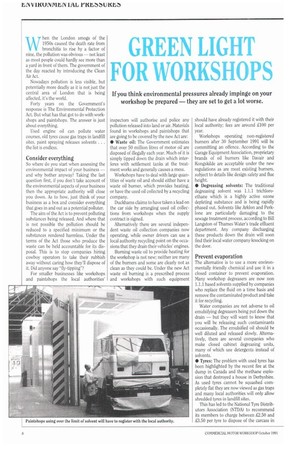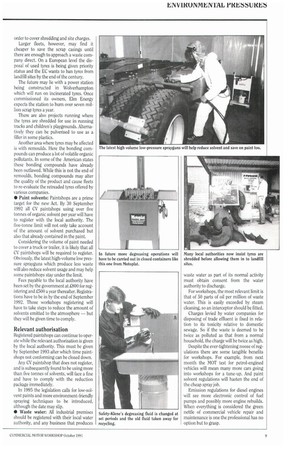GREEN LIGHT FOR WORKSHOPS
Page 96

Page 97

If you've noticed an error in this article please click here to report it so we can fix it.
If you think environmental pressures already impinge on your workshop be prepared — they are set to get a lot worse.
When the London smogs of the 1950s caused the death rate from bronchitis to rise by a factor of nine, the pollution was obvious — not least as most people could hardly see more than a yard in front of them. The government of the day reacted by introducing the Clean Air Act.
Nowadays pollution is less visible, but potentially more deadly as it is not just the central area of London that is being affected, it's the world.
Forty years on the Government's response is The Environmental Protection Act. But what has that got to do with workshops and pain tshops. The answer is just about everything.
Used engine oil can pollute water courses, old tyres cause gas traps in landfill sites, paint spraying releases solvents . . . the list is endless.
Consider everything
So where do you start when assessing the environmental impact of your business — and why bother anyway? Taking the last question first, if you don't take account of the environmental aspects of your business then the appropriate authority will close you down. As to how, just think of your business as a box and consider everything that goes in and out as a potential polluter.
The aim of the Act is to prevent polluting substances being released. And where that is not possible the pollution should be reduced to a specified minimum or the substances rendered harmless. Under the terms of the Act those who produce the waste can be held accountable for its disposal. This is to stop companies hiring cowboy operators to take their rubbish away without caring how they'll dispose of it. Did anyone say "fly-tipping"?
For smaller businesses like workshops and pain Lshops the local authorities' inspectors will authorise and police any pollution released into land or air. Materials found in workshops and paintshops that are going to be covered by the new Act are: • Waste oil: The Government estimates that over 50 million litres of motor oil are disposed of illegally each year. Much of it is simply tipped down the drain which interferes with settlement tanks at the treatment works and generally causes a mess.
Workshops have to deal with large quantities of waste oil and should either have a waste oil burner, which provides heating, or have the used oil collected by a recycling company.
Duckhams claims to have taken a lead on the car side by arranging used oil collections from workshops when the supply contract is signed.
Alternatively there are several independent waste oil collection companies now operating, while owner drivers can use a local authority recycling point on the occasions that they drain their vehicles' engines.
Burning waste oil to provide heating for the workshop is not new; neither are many of the burners and some are clearly not as clean as they could be. Under the new Act waste oil burning is a prescribed process and workshops with such equipment should have already registered it with their local authority; fees are around £100 per year.
Workshops operating non-registered burners after 30 September 1991 will be committing an offence. According to the Garage Equipment Association, proprietary brands of oil burners like Davair and Kongskilde are acceptable under the new regulations as are most existing burners, subject to details like design safety and flue height.
• Degreasing solvents: The traditional degreasing solvent was 1.1.1 trichloroethane which is a highly active ozone depleting substance and is being rapidly phased out. Solvents like Arklon and Perklone are particularly damaging to the sewage treatment process, according LO Bill Langston of Thames Water's trade effluent department. Any company discharging these products down the drain will soon find their local water company knocking on the door.
Prevent evaporation
The alternative is to use a more environmentally friendly chemical and use it in a closed container to prevent evaporation. Many workshop degreasers are now non 1.1.1 based solvents supplied by companies who replace the fluid on a time basis and remove the contaminated product and take it for recycling.
Water companies are not adverse to oil emulsifying degreasers being put down the drain — but they will want to know that you will be releasing such contaminants occasionally. The emulsified oil should be well diluted and released slowly. Alternatively, there are several companies who make closed cabinet degreasing units, many of which use detergents instead of solvents.
• Tyres: The problem with used tyres has been highlighted by the recent fire at the dump in Canada and the methane explosion that destroyed a house in Derbyshire. As used tyres cannot be squashed completely flat they are now viewed as gas traps and many local authorities will only allow shredded lyres in landfill sites.
This has led to the National Tyre Distributors Association (NTDA) to recommend its members to charge between £2.50 and £3.50 per tyre to dispose of the carcass in order to cover shredding and site charges.
Larger fleets, however, may find it cheaper to save the scrap casings until there are enough to approach a waste company direct. On a European level the disposal of used tyres is being given priority status and the EC wants to ban tyres from landfill sites by the end of the century.
The future may lie with a power station being constructed in Wolverhampton which will run on incinerated tyres. Once commissioned its owners, Elm Energy expects the station to burn over seven million scrap tyres a year.
There are also projects running where the tyres are shredded for use in running tracks and children's playgrounds. Alternatively they can be pulverised to use as a filler in some plastics.
Another area where tyres may be affected is with remoulds. Here the bonding compounds can produce a lot of volatile organic pollutants. In some of the American states these bonding compounds have already been outlawed. While this is not the end of remoulds, bonding compounds may alter the quality of the product and cause fleets to re-evaluate the retreaded tyres offered by various companies.
• Paint solvents: Paintshops are a prime target for the new Act. By 30 September 1992 all CV paintshops using over Five tonnes of organic solvent per year will have to register with the local authority. The five-tonne limit will not only take account of the amount of solvent purchased but also that already contained in the paint
Considering the volume of paint needed to cover a truck or trailer, it is likely that all CV paintshops will be required to register. Obviously, the latest high-volume low pressure sprayguns which produce less waste will also reduce solvent usage and may help some paintshops stay under the limit.
Fees payable to the local authority have been set by the government at 000 for registering and £500 a year thereafter. Registrations have to be in by the end of September 1992. Those workshops registering will have to take steps to reduce the amount of solvents emitted to the atmosphere — but they will be given time to comply.
Relevant authorisation
Registered paintshops can continue to operate while the relevant authorisation is given by the local authority. This must be given by September 1993 after which time paintshops not conforming can be closed down.
Any CV paintshop that does not register, and is subsequently found to be using more than five tonnes of solvents, will face a fine and have to comply with the reduction package immediately.
In 1995 the legislation calls for low-solvent paints and more environment-friendly spraying techniques to be introduced, although the date may skip.
• Waste water: All industrial premises should be registered with their local water authority, and any business that produces
waste water as part of its normal activity must obtain consent from the water authority to discharge.
For workshops, the most relevant limit is that of 50 parts of oil per million of waste water. This is easily exceeded by steam cleaning, so an interceptor should be fitted.
Charges levied by water companies for disposing of trade effluent is fixed in relation to its toxicity relative to domestic sewage. So if the waste is deemed to be twice as polluted as that from a normal household, the charge will be twice as high.
Despite the ever-tightening noose of regulations there are some tangible benefits for workshops. For example, from next month the MOT test for petrol-engined vehicles will mean many more cars going into workshops for a tune-up. And paint solvent regulations will hasten the end of the cheap spray job.
Emission regulations for diesel engines will see more electronic control of fuel pumps and possibly more engine rebuilds. When everything is considered the green nettle of commercial vehicle repair and maintenance is one the professional has no option but to grasp.
















































































































